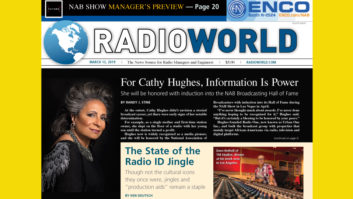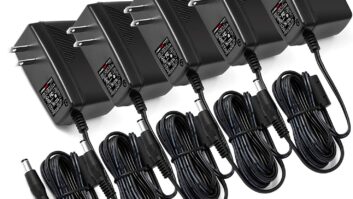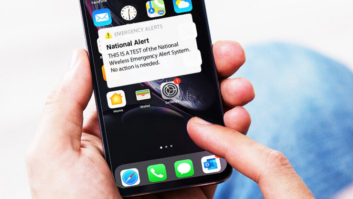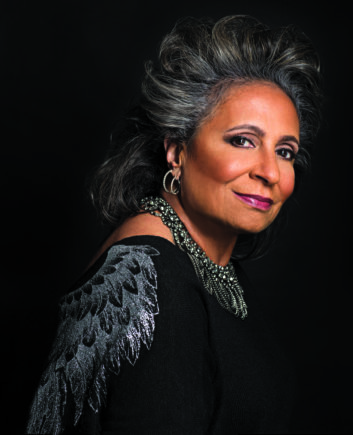
At the outset, Cathy Hughes didn’t envision a storied broadcast career, yet there were early signs of her notable determination.
For example, as a single mother and first-time station owner, she slept on the floor of a studio with her young son until the station turned a profit.
Hughes now is widely recognized as a media pioneer, and she will be honored by the National Association of Broadcasters with induction into its Hall of Fame during the NAB Show in Las Vegas in April.
“I’ve never thought much about awards. I’ve never done anything hoping to be recognized for it,” Hughes said. “But it’s certainly a blessing to be honored by your peers.”
Hughes founded Radio One, now known as Urban One Inc., and built the broadcast group with properties that mainly target African-Americans via radio, television and digital platforms.
“Cathy Hughes is a truly remarkable broadcaster and entrepreneur whose contributions continue to greatly influence and drive our industry,” said Gordon Smith, NAB president and CEO.
“REPRESENTING BLACK CULTURE”
Now age 71 and the chairperson of Urban One, Hughes adds the award to a list of noteworthy accomplishments.
She was the first woman to own a radio station that ranked number one in a major market, and the first female vice president and general manager of a station in the nation’s capital. She was the first African-American woman to head a publicly traded company, when Radio One went public in 1999.
She is the first radio station owner inducted to the NAB Broadcasting Hall of Fame. In addition, Hughes won the NAB’s Distinguished Service Award in 2001; it is given to broadcasters who have made a significant and lasting contribution to the American system of broadcasting.
Hughes has helped shape black entertainment in the United States. Urban One, based in a Silver Spring, Md., is today the country’s largest distributor of urban content. Its maxim is “representing black culture.” Hughes’ son, Alfred Liggins III, is CEO. The company operates 43 FM stations, 12 AMs and 13 FM translators in 15 urban markets.
Urban One also owns TV One, a television network serving more than 59 million households, along with Cleo TV. In addition, the company provides social content and entertainment through digital platform iOneDigital; and it has a controlling interest in Reach Media Inc., which operates syndicated programming including “The Tom Joyner Morning Show.”
“When I envisioned a career in radio, I was only hoping for a chance to reach people with a message of self-determination, enlightenment and inspiration. My motto has always been information is power. I’ve tried my best to set a good example and inspire others to achieve whatever it is they dream of,” Hughes said.
Born Catherine Elizabeth Woods and raised in Nebraska, she began her broadcast career in 1969 at KOWH(AM) in Omaha, the first black radio station in the city, as a 21-year-old “gofer” — but one with a special interest in the property. She invested $10,000 in the radio station from an inheritance.
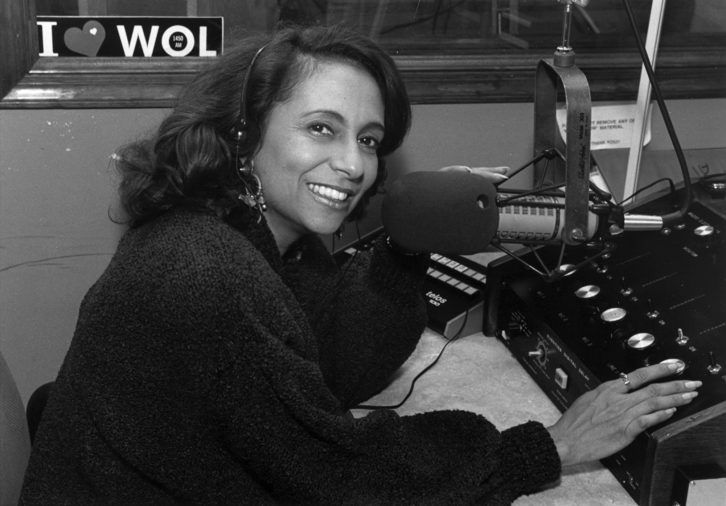
Credit: Jason Miccolo Johnson
“I had this money after my father passed away,” she recalled. “The radio station owners at the time were not looking for investors, but I volunteered the investment and figured having a stake in the company would afford me more opportunities to learn the radio business and have responsibility for its success. Thankfully they were kind enough to pay back my entire investment in full when I left.”
In the early 1970s she moved to Washington after accepting a post as lecturer at the School of Communications at Howard University. Several radio jobs followed, including a long stint as general manager at the school’s WHUR(FM), where she helped pioneer the smooth jazz Quiet Storm format that, in NAB’s words, “revolutionized” urban radio.
The beginnings of Radio One can be traced to the purchase of WOL(AM) in Washington in 1979 for nearly a million dollars. There is an infamous story that she and her husband Dewey Hughes were turned down by 32 lending institutions before securing a loan. She confirmed that it happened.
“Quite frankly, at the time the lending institutions didn’t recognizing the value of radio properties and the potential of the media industry. The banks were more interested in whether I planned to have more children, which had nothing to do with my ability to pay back a loan. So it was difficult to find the money,” Hughes said.
Soon thereafter the couple divorced, with Cathy Hughes buying out her second husband’s share of WOL. Difficult financial times ensued, with Hughes at one point losing her home and being forced to live at the station.
“I was young, black and female. Being a woman of color, I didn’t have any role models to consult with,” she said.
Hughes hosted a morning show on the radio station and pioneered another innovative format known as “24-hour Talk From a Black Perspective.” The company added its first FM radio station, WMMJ(FM), in Washington in 1987.
Urban One grew dramatically in the span of several years after going public in 1999, adding 35 radio stations from 10 owners in markets like Los Angeles, Atlanta, Dallas, Houston and Philadelphia.
“It was a very frightening time. We went from family owned to being a public company with a new set of criteria and shareholders to answer to,” she said. “It was also a daunting time in radio. You had to grow or go. There was so much consolidation when the FCC lifted the number of stations a single group could own. We learned so much during that time. It was the launching of a whole new era in radio.”
FINANCING CHALLENGES
Hughes laments the lack of minority radio owners, which she blames partly on lending practices.
“Things have changed now. If you come in looking for financing and you don’t have major markets included, it’s hard to get financed,” Hughes said.
“If you want financing for a station in Slippery Rock, Ark., you’ll have a hard time finding it, unless you have a station in Alabama and Georgia to go along with it. Lending policies and philosophies have changed dramatically because of new media and the change in listening habits.
“When I started in radio, we competed against other radio stations; and now we have multiple platforms competing against streaming services, all the apps out there and satellite radio. There are so many other choices.”
The current pool of African-American entrepreneurs looking to enter broadcast is shallow, she says, thanks to two major obstacles: “Securing the money to get in and then securing the advertising to stay in.”
An FCC incubator program, designed to support new and diverse entrants in radio by encouraging larger, experienced broadcasters to assist small, aspiring or struggling ones, is helping, but more can be done.
“At one time, there were more advocates for diversification at the FCC,” she said. “There has to be a commitment and it has to be a priority. It’s tough right now. When I talk to people there is a growing skepticism about radio. That’s a deterrent for lenders, who are now very sophisticated with their practices. And folks question the opportunities out there now.”
Hughes, who also serves on the BMI board of directors, is still a big believer in radio and remains optimistic about the future of Urban One.
“The industry is changing for sure. But change makes us all adjust and grow. Black radio in this country is especially strong. We did extensive research a few years back, and black radio ranked only second to the black church when it comes to credibility in the news and entertainment we distribute. I know we are very responsive to the needs of the communities we serve.”
Urban One will keep adding stations to its ranks — it purchased WTEM(AM) in Washington in 2018 — when opportunities arise, she said.
FAMILY BLESSING
Hughes said the most fulfilling experience in her 50-year career to date has been seeing her son, Alfred, follow in the business. He was named president in 1989 and is now CEO.
“I look at the Mays family and the Beasley family, and really see it as a blessing when the next generation embraces your dream and then take it to a higher level,” she said, referring to two other notable American broadcast clans.
“It’s gratifying to see him have the same vision and be even more excited than me about growing the company. I only have one child but I’m so very proud of him,” she said. “I kiddingly tell people that Alfred runs the company, and I run Alfred, and my job is 10 times harder than his.”
Hughes is a philanthropist and supportive of black causes. The Catherine L. Hughes and Alfred C. Liggins III Foundation gave a multi-million dollar gift to Howard University recently. She continues her family’s work and legacy at The Piney Woods School in Piney Woods, Miss., which was established by her grandfather in 1909 and is the largest of only four African-American boarding schools in the country.
She states in a profile on the company website, “I am a champion for the hungry and homeless, a mentor to countless women and a staunch advocate to empowering minority communities.”
Hughes still resides in Washington, where she advocates for gaining statehood rights for the district. She also is chairperson of the Congressional Black Caucus Foundation.
Comment on this or any story to [email protected] with “Letter to the Editor” in the subject field.
